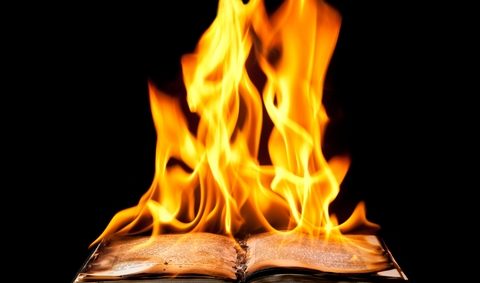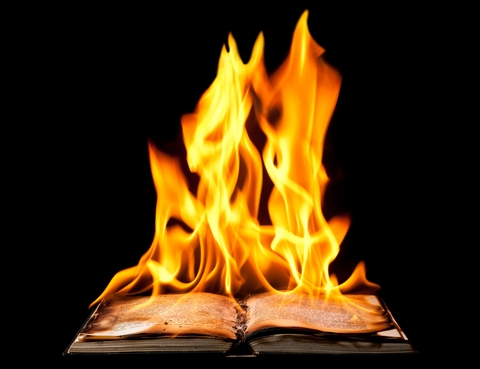
Book Banning and Burning…it’s back!

Book banning Book burning.
The Nazis did it in the 1930’s. The Red Guard did it during the Cultural Revolution.
Want to know when the earliest recorded state book burning occurred? China in 213 BCE. Yep, that long ago. Emperor Qin Shi Huang burned books he deemed uncomplimentary to his regime. And since then, many countries, states, and provinces have joined in book banning and book burning.
Journalist Daniel Schwartz details this history in his article, “The Books Have Been Burning.” In one example, Schwartz reveals how Kurt Vonnegut came under attack in North Dakota in 1973. The school board burned 32 copies of Slaughterhouse-Five. (I know…a classic, right?) The board even asked students to give up their own copies of the book, and when the students refused, the board issued a decree that their lockers be searched. Wow!
A recent article in the Washington Post, “‘I Think We Should Throw those Books in a Fire‘” by Aaron Blake, highlighted the growing movement to remove certain books from school libraries.
Of course, the effort to remove books from libraries is not new. Banned Books Week, co-founded by librarian and free speech activist Judith Krug, has been celebrated since 1982. Every September, librarians, booksellers, parents, and teachers encourage people to read a book placed on the list. Some high school teachers even assign a writing project based on the event: read a banned book and then write an argument essay supporting or defending the ban.
I participate in Banned Books Week most years, and sometimes I even blog about it. One of the most famous banned books is Beloved by Toni Morrison. You can read my review of Beloved here.
Last month, Virginia governor-elect Glenn Youngkin released a campaign ad that featured a mother wringing her hands over her child reading Beloved for a school assignment, explaining how that book gave him nightmares. Youngkin used that ad to promote horror in his followers. Naturally, the ad fails to mention that this mother’s child is now 27, and he read the book in an AP (college level) high school course more than a decade ago.
Unfortunately, the book banning movement is now gaining traction. A school board in Kansas removed 29 books from circulation including a Pulitzer-winning play by August Wilson and an additional novel by Toni Morrison. And following Youngkin’s election in Virginia, two school board members advocated actually burning books. And Texas state Representative Michael Krause offered a list of 800 books he considers suspect, including award winning books.
Krause’s stated motivation is that students not feel “discomfort, guilt, anguish” based on their race or sex. I challenge anyone not to feel guilt or anguish when reading certain uncomfortable truths about our shared past. And, yes, Beloved is disturbing. Morrison puts the reader directly into the mind and body of a slave. And that is terribly disturbing. As it’s meant to be.
The problem is that if we cut ourselves off from certain stories that make us uncomfortable…well, you know what they say about history repeating itself.
Oscar Wilde wrote “the books that the world calls immoral are books that show the world its own shame.” We must look shame in the eye, however uncomfortable, and learn from the experience. And go forth and do better.